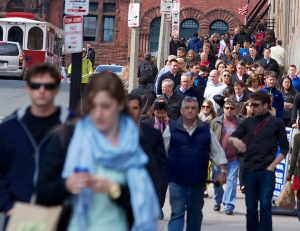 Moment of silence for Boston bombing victims. Photo by Rebecca Hildreth at Flick Creative Commons
Moment of silence for Boston bombing victims. Photo by Rebecca Hildreth at Flick Creative Commons
Pierre R. Berastaín, a student at Harvard Divinity School, proposes that restorative circle processes be used to address the violence last week at the Boston Marathon, and the frayed feelings of people throughout the city of Boston and elsewhere. Writing on a Huffington Post blog, in a piece titled "Restorative Justice: Re-storying What Happened in Boston," Berastaín reflects that "Nothing is over; nothing returns to normal," but he offers a suggestion:
[R]estorative practices [can] help us deal with trauma, as these practices call us to sit in circle to process and connect with each other through the common thread of our experiences.
This is an invitation, then, for principals, managers, and parents to find a talking piece -- any object, really -- and sit in small circles with their respective communities. Teachers can pose questions for sharing: What did you do on Friday during the lock-down? Pass the talking piece around the circle, remembering that the person who holds it has the privilege of speaking while everyone else has the privilege of listening. How are things different for you now? Pass the talking piece. What are you most afraid of today? Pass the talking piece again. These questions might strike some as superficial, but if allowed to sink in, one sees how people begin to share deeply affective moments and experiences.
Author Joan Didion once wrote, "We tell ourselves stories in order to live." She couldn't be more right. We also tell stories in order to degrade pain. Through the restorative approach, we can sit in circle and 're-story' our lives, our experiences of shock, and our understandings of the bombings.
Life does not return to normal. Life becomes surreal and altered; recalibrated is our sense of the world around us. I still go to sleep wondering whether more bombs will appear in the city, whether my family will be okay, whether the sounds of sirens and the choppers of helicopters will bring memories of unease. I know I'm not alone. In fact, our friends in Israel and Palestine, Syria and West Texas, China and Newtown have nightmares, too. Restorative practices--the circle--can help us determine what our needs are, and how we, as a community, can better meet them.
The complete article may be found here.
